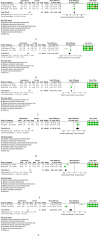Efficacy and safety of dietary polyphenol supplements for COPD: a systematic review and meta-analysis
- PMID: 40771814
- PMCID: PMC12325041
- DOI: 10.3389/fimmu.2025.1617694
Efficacy and safety of dietary polyphenol supplements for COPD: a systematic review and meta-analysis
Abstract
Background: The therapeutic application of dietary polyphenols in chronic obstructive pulmonary disease (COPD) management represents an emerging therapeutic paradigm in pulmonary medicine. As bioactive compounds exhibiting dual antioxidant and anti-inflammatory properties, polyphenolic derivatives demonstrate significant therapeutic potential through multimodal mechanisms targeting COPD pathophysiology - particularly in modulating redox homeostasis (GSH/GSSG ratio elevation), attenuating NF-κB-mediated inflammatory cascades, and enhancing respiratory function parameters (FEV1 improvement ≥12% from baseline). However, current clinical evidence remains inconclusive, with meta-analyses revealing heterogeneity in intervention outcomes across randomized controlled trials. This systematic investigation employs a triple-blind, placebo-controlled design to rigorously evaluate the clinical efficacy of standardized oral polyphenol supplementation in COPD patients (GOLD stages II-III), incorporating advanced biomarkers including 8-isoprostane quantification and pulmonary function trajectory analysis.
Methods: Literature on dietary polyphenols for the treatment of COPD published in PubMed, Cochrane, Medline, CNKI and other databases before December 26, 2024 (in Chinese and English) was searched. Manual screening, quality assessment and data extraction of search results were performed in strict accordance with the inclusion and exclusion criteria. Meta-analysis was performed using RevMan 5.3 software.
Results: The randomized controlled trials (RCTs) included in this review examined dietary supplementation with eight polyphenols-curcumin, resveratrol, anthocyanins, quercetin, salidroside, dietary beetroot juice, pomegranate juice, and adjunctive oral AKL1 treatment-across a total of 894 participants. This systematic review and meta-analysis revealed that, compared to a placebo; ① Curcumin significantly reduced systolic blood pressure (SBP) and improved FEV1(SMD=-0.82, 95%CI -1.53 to -0.11); ② Salidroside was effective in reducing thrombotic markers (TT, D-D), inflammatory factors (TNF-α) and symptom scores (CAT) (p<0.01); ③ Resveratrol significantly downregulates serum TNF-α and IL-8 levels (p=0.003); ④ Anthocyanins may accelerate lung function decline (decreased FEV1/FVC, which needs to be interpreted with caution); ⑤ Other polyphenols (quercetin, pomegranate juice, AKL1, etc.) did not show significant efficacy or insufficient evidence. It is worth noting that the overall meta-analysis of some indicators (such as FEV1/FVC) did not reach statistical significance, but subgroup analysis suggested the potential value of specific polyphenols.
Conclusion: This systematic review confirms that the efficacy of dietary polyphenols is significantly composition-specific. Curcumin and salidroside can improve the course of COPD by regulating blood pressure, inflammation, and the coagulation pathway, supporting the hypothesis of "polyphenol targeting of metabolic-inflammatory networks". However, the possible negative effects of anthocyanins warn against ingredient heterogeneity. Clinical significance: Curcumin (200-500 mg/day) and tanshinone are recommended as adjuvant treatment options for COPD, but blind combination should be avoided; the safety of ingredients such as quercetin needs to be further verified. These results provide graded evidence for personalized nutritional interventions, promoting the transformation of polyphenol preparations from dietary supplements to precision adjuvant therapies.
Keywords: chronic obstructive pulmonary disease; curcumin; dietary polyphenols; meta-analysis; salidroside.
Copyright © 2025 Wu, Dong, Zhang, Wang, Ye and Zhang.
Conflict of interest statement
The authors declare that the research was conducted in the absence of any commercial or financial relationships that could be construed as a potential conflict of interest.
Figures








Similar articles
-
Systemic pharmacological treatments for chronic plaque psoriasis: a network meta-analysis.Cochrane Database Syst Rev. 2021 Apr 19;4(4):CD011535. doi: 10.1002/14651858.CD011535.pub4. Cochrane Database Syst Rev. 2021. Update in: Cochrane Database Syst Rev. 2022 May 23;5:CD011535. doi: 10.1002/14651858.CD011535.pub5. PMID: 33871055 Free PMC article. Updated.
-
Systemic pharmacological treatments for chronic plaque psoriasis: a network meta-analysis.Cochrane Database Syst Rev. 2020 Jan 9;1(1):CD011535. doi: 10.1002/14651858.CD011535.pub3. Cochrane Database Syst Rev. 2020. Update in: Cochrane Database Syst Rev. 2021 Apr 19;4:CD011535. doi: 10.1002/14651858.CD011535.pub4. PMID: 31917873 Free PMC article. Updated.
-
Systemic pharmacological treatments for chronic plaque psoriasis: a network meta-analysis.Cochrane Database Syst Rev. 2017 Dec 22;12(12):CD011535. doi: 10.1002/14651858.CD011535.pub2. Cochrane Database Syst Rev. 2017. Update in: Cochrane Database Syst Rev. 2020 Jan 9;1:CD011535. doi: 10.1002/14651858.CD011535.pub3. PMID: 29271481 Free PMC article. Updated.
-
Systemic treatments for metastatic cutaneous melanoma.Cochrane Database Syst Rev. 2018 Feb 6;2(2):CD011123. doi: 10.1002/14651858.CD011123.pub2. Cochrane Database Syst Rev. 2018. PMID: 29405038 Free PMC article.
-
[Guidelines for the prevention and management of bronchial asthma (2024 edition)].Zhonghua Jie He He Hu Xi Za Zhi. 2025 Mar 12;48(3):208-248. doi: 10.3760/cma.j.cn112147-20241013-00601. Zhonghua Jie He He Hu Xi Za Zhi. 2025. PMID: 40050074 Chinese.
Cited by
-
Cyclodextrin-Based Nanotransporters as a Versatile Tool to Manage Oxidative Stress-Induced Lung Diseases.Antioxidants (Basel). 2025 Aug 17;14(8):1007. doi: 10.3390/antiox14081007. Antioxidants (Basel). 2025. PMID: 40867903 Free PMC article. Review.
References
-
- Global strategy for the diagnosis, management, and prevention of chronic obstructive pulmonary disease: 2025 report. Global Initiative for Chronic Obstructive Lung Disease (GOLD. Available online at: https://goldcopd.org/wp-content/uploads/2024/11/GOLD-2025-Report-v1.0-15.... (Accessed November 11, 2024).
-
- Lozano R, Naghavi M, Foreman K, Lim S, Shibuya K, Aboyans V, et al. Global and regional mortality from 235 causes of death for 20 age groups in 1990 and 2010: A systematic analysis for the global burden of disease study 2010. Lancet. (2012) 380:2095–128. doi: 10.1016/s0140-6736(12)61728-0, PMID: - DOI - PMC - PubMed
Publication types
MeSH terms
Substances
LinkOut - more resources
Full Text Sources
Medical
Research Materials
Miscellaneous

